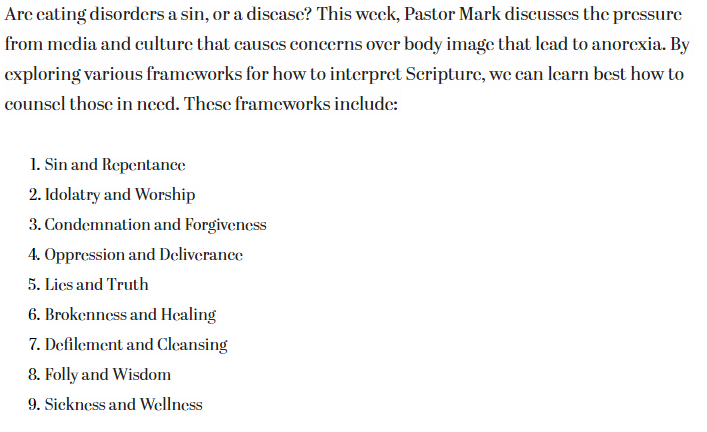 I was sad to hear about the untimely death of Soundgarden front man Chris Cornell apparently by suicide. His talent was undeniable and many of the songs he crafted came from a special creative place. I believe Spoonman is in the top ten rock songs of all time.
I was sad to hear about the untimely death of Soundgarden front man Chris Cornell apparently by suicide. His talent was undeniable and many of the songs he crafted came from a special creative place. I believe Spoonman is in the top ten rock songs of all time.
[youtube]https://www.youtube.com/watch?v=T0_zzCLLRvE[/youtube]
I pray his family can find peace.
Category: mental health
Mark Driscoll Takes On Anorexia, Might Be Demonic
 Mark Driscoll’s most recent video takes on the question: is anorexia a sin (click the link to view the video)?
Mark Driscoll’s most recent video takes on the question: is anorexia a sin (click the link to view the video)?
The prompt for the video is a letter from a young woman who says she has struggled with anorexia for years. In her note, she asks Driscoll if anorexia is a sin.
First, Driscoll expresses appropriate concern for the writer. I share that concern. Anorexia is a baffling condition. However, there are good treatment protocols and with competent help, those who struggle with it can find help.
Unfortunately, Driscoll doesn’t refer her to anything like competent help. She tells him that her pastor said an eating disorder is a disease and her Christian 12 step program said it is rooted in sin. She wants to know what Driscoll thinks.
The right answer is that she has a condition that should be treated medically. Sounds like she needs to get out of that 12-step group.
From his website, here is the list of factors he uses to answer her question.

In Driscoll’s way of thinking, anorexia could be almost anything, including idolatry or the work of demons. Speaking of demons at 8:40 into the clip, Driscoll says:
This is where Satan, demons are lying to you, tempting you. The Bible says that Satan is the accuser of the children of God. He accuses them day and night in Revelation 12:10 there are accusations. If you start realizing this oppression, you can get out of it by acknowledging what God has to say. Oppression, an accusation, is often in the second person, you are unlovable, you need to punish yourself, you don’t appear attractive, whatever the oppression is, it’s telling you something that’s just not true. And so, what you need to understand is that’s demonic, that God doesn’t speak to you that way and if you’re hearing in the second person, maybe someone is talking to you, a spiritual being is lying to you, I’ll get to that in just a moment, and the way out is deliverance, you have victory in Christ, Colossians 2 says He has disarmed and defeated the powers and principalities of evil, triumphing over them through his victorious forgiveness of sinners on the cross.
He adds that the oppression may have come on her and that it might even be generational in her family such that women in her family are “under this kind of demonic torment and oppression and God wants you to rebuke that and walk in freedom and deliverance.”
This point reminds me of Driscoll’s Mars Hill Church spiritual warfare sermons where he describes demon trials for oppressed people.
Driscoll’s last point gets closer to where he should have started and ended. He tells the young woman that she may have medical problems, although he doesn’t specifically refer her for treatment.
For more information on eating disorders, check out this NIH website.
PS – I find some of what Driscoll said about acceptance of body image to be incompatible with what he and his wife wrote in Real Marriage about cosmetic surgery. Read Tim Chailles reaction to the Driscoll’s approval of cosmetic surgery.
Tennessee Governor Signs Bill Allowing Counselors To Refer Based On Counselor's "Sincerely Held Principles"
Previously, I posted a link to a Tennessee bill which gives permission to counselors to refer clients over conflicts with a counselor’s “sincerely held beliefs.”
Last week, Tennessee Governor Bill Haslam signed the bill into law. His reasoning was summarized in a statement after he signed the bill:
The following is the Gov. Haslam’s statement on Senate Bill 1556 (http://www.capitol.tn.gov/Bills/109/Amend/HA1006.pdf):
“Although Senate Bill 1556 has received attention for its perceived focus, my job is to look at the actual substance of the legislation. After considerable thought and discussion with counselors both for and against the bill, I have decided to sign Senate Bill 1556. There are two key provisions of this legislation that addressed concerns I had about clients not receiving care. First, the bill clearly states that it ‘shall not apply to a counselor or therapist when an individual seeking or undergoing counseling is in imminent danger of harming themselves or others.’ Secondly, the bill requires that any counselor or therapist who feels they cannot serve a client due to the counselor’s sincerely held principles must coordinate a referral of the client to another counselor or therapist who will provide the counseling or therapy,” Haslam said.
“The substance of this bill doesn’t address a group, issue or belief system. Rather, it allows counselors – just as we allow other professionals like doctors and lawyers – to refer a client to another counselor when the goals or behaviors would violate a sincerely held principle. I believe it is reasonable to allow these professionals to determine if and when an individual would be better served by another counselor better suited to meet his or her needs.”
The bill was signed by the speakers on April 13 and transmitted to the governor for action on April 15.
The bill language is available at http://www.capitol.tn.gov/Bills/109/Amend/HA1006.pdf.
While I appreciate the amendments requiring care in cases of homicidal or suicidal risk, I don’t support this bill. This bill allows discriminatory actions toward anyone, including religious people, based on a vague condition of a counselor’s conflict involving “sincerely held principles.” While I believe some conflicts could be so great that a referral would be the best course of action in the immediate situation, this bill points counselors in another direction. For mental health care to be fully integrated with health care, a value of treating all people is required. I don’t want a health care system where providers are allowed to delay care based on personal disagreements with patients. I do think providers should be allowed to decline performing certain treatments (e.g., abortion, hypnosis, EMDR, etc.) but I don’t think a referral based on personal disagreement should be the norm in health care.
Q & A With Jackie Quinn, Director of Communications at Mercy Multiplied
Last Sunday, Jennifer Miller’s article posted on Slate.com about Nashville-based ministry Mercy Multiplied raised concerns about religiously based residential treatment for women. Miller interviewed several former residents who told troubling stories about their time in one Mercy’s four residential facilities. Specifically, the former residents said they were discouraged from taking medication for mental illness, and said the program encouraged the removal of demons as a means of ridding residents of their emotional pain and problems. Calling themselves survivors, they said they were harmed by their time in the ministry.
To find out more about Mercy’s point of view, I contacted Jackie Quinn who is Director of Communications at Mercy Multiplied. The following is a Q&A with Quinn (one question also has a response from CEO Christy Singleton) which covers some of the key concerns raised by the Slate article (my questions are in bold print, following by Quinn’s replies).
Throckmorton: Do you have a direct response to the Slate article?
Quinn: Mercy is not responding to the Slate article.
Are Mercy’s counselors licensed by the state?
Counselors are not required to be licensed by the state; however, about half are licensed or pursuing licensure. Here are the credentials for counselors as found on our website under Program FAQs:
Each counselor at Mercy is required to hold a bachelor’s degree from an accredited university in social work, psychology, counseling or a related field. 80% of our counselors have master’s degrees.
What kind of graduate degrees are held by your counselors? Are they in counseling or ministry or both?
(In response, Quinn gave me a list of degrees held by 15 counselors. In summary, five have MA or MS degrees in counseling, with two having a master’s degree in marriage and family therapy. The remaining master’s degree titles are social work (MSW), clinical mental health counseling, education with a concentration in clinical counseling, human services counseling, counseling and human services, professional counseling and family ministry.)
Do all girls go through Nancy Alcorn’s 7 step model?
As stated on our website under Program FAQs, “Trained counselors lead residents through the program curriculum,” Choices That Bring Change, so yes, all resident go through this curriculum (below is the full excerpt from our website):
Our Christian-based program curriculum, “Choices That Bring Change,” is the result of our three decades of ministering to girls in crisis and combines biblical principles of healing and unconditional love with best-practice clinical interventions, as outlined in Ditch the Baggage by Nancy Alcorn.
Trained counselors lead residents through the program curriculum, helping them explore issues of faith, forgiveness, family, overcoming abuse and past hurts, and general life principles. In addition to the curriculum, program resources feature internationally acclaimed teachers such as Beth Moore, Priscilla Shirer, Joyce Meyer, Dave Ramsey, Andy Stanley and Charlotte Gambill. Residents participate in both individual and group counseling on a weekly basis.
Are girls ever asked to let Jesus reveal a past trauma?
Our counseling procedures do not permit the use of restored memory therapy or other imagery techniques designed to evoke memories.
Let me be more specific. Do counselors ever indicate to girls that Jesus has revealed a past trauma to either the girl or the counselor? This could be theophostic type counseling or some similar approach.
Mercy counselors do not use theophostic counseling or restored memory therapy or any technique like you are describing in your question.
What is Mercy’s position regarding the use of medication to treat mental and emotional problems.? Is medication discouraged for girls who are depressed or anxious?
Regarding medication from the website under program FAQs:
Although we are not a medical facility, some of the young women who enter our program have medical issues that need to be managed. To that end, our homes employ medical staff, and we provide adequate medical care for residents – including care from outside professionals who are called upon to help on a regular basis, as there is not a physician on staff.
Mercy does not discourage the use of medication. In fact, Mercy values the role medical intervention and pharmaceuticals have in helping young women struggling with depression, anxiety and other psychiatric conditions. Mercy staff follow directions from outside physicians with regard to medication as it is not our place to make medication determinations. The overwhelming majority of our residents are on some kind of medication during their stay at Mercy some of which they have in place before coming and some of which is prescribed after they come into the program. As is common in therapy and counseling, when a young women progresses through processing pasts hurts and trauma, she may find that certain medications do not seem to be needed anymore. However, this is something she would handle with the outside physician she sees and not determined by Mercy staff.
About medication, is this a change in policy or belief since the 2008 video of Nancy Alcorn (see video below) saying that you don’t medicate demons?
The belief about medication does not reflect a change in policy or belief. Mercy has always had that stance and belief.
Can you help me reconcile your statement about medication and the sermon in 2008 where Nancy Alcorn says “Jesus did not say to medicate a demon.”
I was not working at Mercy in 2008, so I checked with Mercy’s Executive Director, Christy Singleton, who was working here, for a response. Here is her response:
As you likely have discovered in your research, Nancy is from a Charismatic background, and the video you reference from 2008 was filmed during a worship service in which Nancy was speaking to a Charismatic congregation. Ever since Jesus taught his disciples to overcome the evil of the world, often referenced as “demons” or “demonic forces” in English translations of the Bible, Christians from many traditions have been rejecting evil, praying against evil forces, praying against the devil, and asking God to relieve them from oppression of demonic forces, or demons. Mercy follows in this same Christian tradition of rejecting all forms of spiritual darkness. (This is not just a Charismatic stance; witness any Methodist confirmation or baptism and attend to the liturgy.) Certainly, in a Charismatic church, you would expect to hear the term “demon” or “demons” to reference the evil Christians are to reject. In this video, Nancy was addressing a Charismatic congregation and speaking about spiritual issues. That being said, Nancy’s statements are not incompatible with our stance regarding medication, nor has Nancy ever been against medication when medication is warranted.
Simply put, Mercy does not discourage the use of medication. In fact, Mercy values the role medical intervention and pharmaceuticals have in helping young women struggling with depression, anxiety, and other psychiatric conditions. Mercy staff follow directions from outside physicians with regard to medication. In fact, the overwhelming majority of our residents are on some kind of medication during their stay at Mercy; sometimes the medication was in place before attending our program, and sometimes the medication is prescribed after they come into the program. In many situations young women graduate from our program still on medication. It is important to note that every case is different. As is common in therapy and counseling, when a young woman progresses through processing pasts hurts and trauma, she may find that certain medications do not seem to be needed anymore. However, this is something she would handle with her physician and is not determined by Mercy staff.
The clip of Nancy Alcorn talking about removing demons and not medicating them is below and full sermon is also embedded below.
[youtube]https://youtu.be/7o9HDXqBl0c[/youtube]
Full sermon:
[youtube]https://youtu.be/-r-PEFhZ3uE[/youtube]
Mercy Multiplied Is Subject of Slate Exposé
Mercy Multiplied (formerly known as Mercy Ministries) consists of several in-patient facilities which claim to assist young women recover from abuse, eating disorders, and various other mental and emotional conditions. On Sunday, online magazine Slate revealed unflattering and disturbing results of an investigation of the ministry through the eyes of several former patients.
If the reports are true, then Mercy Multiplied should be shut down.
These stories reminded me of the 1990s controversy over repressed memories and especially the Philadelphia area counseling center Genesis Associates. Former Mercy girls told Slate they were led to believe they had been sexually abused and involved in sex trafficking via imagery techniques. They claim that in counseling sessions girls were told by their counselors that God had reveal certain past abusive events. Residents were urged to cast out demons and refuse needed medications.
There seemed to be some similarities to the demon trials described by Mark Driscoll.
This morning, I asked Mercy Multiplied’s Director of Communication Jackie Quinn for a response to the Slate article but did not get a response.
One cannot know if these allegations are true or wide spread but it does provide a cautionary tale to people who are considering counseling to avoid these kind of techniques. I hope Mercy Multiplied will address the possible use of visualization techniques where false memories might be implanted.
From the mid-1990s, here are some clips of Genesis Associates from the documentary Divided Memories.
[youtube]https://www.youtube.com/watch?v=VWoxGEr0nmw[/youtube]
[youtube]https://www.youtube.com/watch?v=waBha5AOAyI[/youtube]
[youtube]https://www.youtube.com/watch?v=yZckrmKCzlU[/youtube]